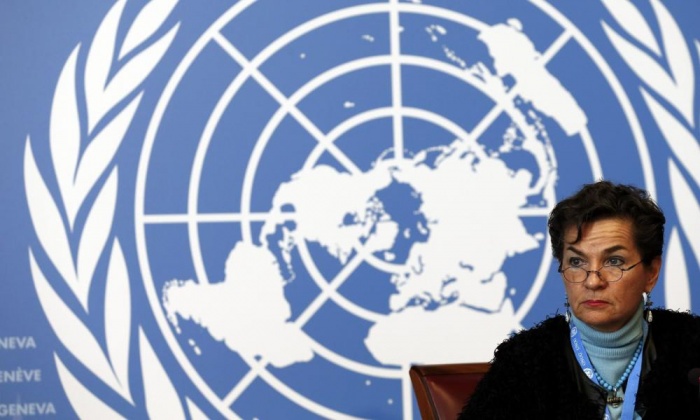发稿时间:2015-05-07来源: Xinhua 【 字体:大中小】

The UN climate chief, Christiana Figueres, has said there was “no space” for new coal developments and stressed the benefits of ambitious renewable energy targets after a meeting with representatives from seven Australian governments.
At the meeting in Adelaide, organised by the South Australian government, federal, state and territory administrations agreed to work more closely to drive an uptake in renewable energy, coordinate energy-efficiency schemes and help communities adapt to climate change.
Figueres, the executive secretary of the United Nations framework convention on climate change, urged the states and territories to work with the federal government to help deliver a “strong” global agreement at key climate talks in Paris in December.
The meeting was attended by the environment ministers of the Labor-run states and territories – Victoria, South Australia, Queensland and the ACT. The federal government, Tasmanian and New South Wales governments were represented at “senior official level”, and Western Australia and the Northern Territory were absent.
According to the meeting’s official communique, Figueres warned of the dangers of the world exceeding 2C of warming compared with pre-industrial times and “emphasised that the science is clear that there is no space for new coal or unmitigated coal”.
Afterwards, Figueres said Australia needed a national consensus to achieve a “maximum possible effort” in the battle to avoid dangerous climate change.
Asked about the federal government’s alleged reticence towards ambitious greenhouse gas reductions, Figueres said “like the oceans, there are ebbs and flows about everything”.
“We welcome that the federal government is turning in its national target by July and I’m confident it will encompass what the states and territories are doing,” she said. “I’m confident we will be pleasantly surprised.”
Figueres said the states and territories could “buttress the efforts of Australia more at the international level so Australia can actually stand up there with other industrialised countries in fair effort”.
“States and territories are a lot closer to citizens than the federal government and perhaps they are reflecting more the concerns about climate change and the opportunities that are there.”
Figueres would not comment directly on the lengthy political impasse over the federal renewable energy target (RET) but said: “In general, the higher the renewable energy target, it does attract investment. If there’s anything that’s growing in recent years in Australia, it’s renewable energy investment. It’s a positive factor to have an ambitious renewable energy target.”
The federal government has begun consulting over emissions reduction targets beyond 2020, which will be the focus of the Paris climate talks.
The state and territory ministers’ communique “noted recommendations by the Climate Change Authority for a minimum 2020 reduction target of 19%, rising to 30% by 2025 in order to meet international expectations”.
The Greens have said the authority’s recommendations would not be enough to help stave off 2C warming, although Greg Hunt, the federal environment minister, has called the proposed goals “onerous”.
South Australia’s climate change minister, Ian Hunter, said he hoped the federal government would “put aside partisanship” and “embrace” the Climate Change Authority’s proposed targets.
Lisa Neville, Victoria’s environment minister, said the Victorian government also backed the Climate Change Authority’s proposed targets.
“Victoria believes that the Commonwealth should accept the recommendations in the Climate Change Authority’s report, a report which the government itself commissioned,” she said.
“The [Daniel] Andrews government has committed to reviewing a Victorian emissions target and i have started the important work on consulting with the experts to get it right.”
Queensland’s environment minister, Steve Miles, said the state was “re-engaging” on climate change after the defeat of a Campbell Newman-led government that reportedly banned a local council from mentioning sea level rises.
“We are ready to work with other states to reduce carbon pollution,” he said. “I can tell you I’m personally committed to limiting global warming to under 2C, for the sake of the Great Barrier Reef, the jobs on the reef and our children’s future.”
Projections released by the CSIRO and Bureau of Meteorology in January show that Australia is set to have an average annual temperature 1.3C higher in 2030 than the average experienced between 1986 and 2005. This will be accompanied by more extreme droughts and less rainfall in the southern portion of the country, according to the projections.
Beyond this, Australia could warm by more than 5C by 2090, compared with pre-industrial times, if little effort is made to cut the amount of greenhouse gases entering the atmosphere.
Australia, which experienced its warmest and third warmest years on record in 2013 and 2014 respectively, has already warmed by 0.9C since 1910.